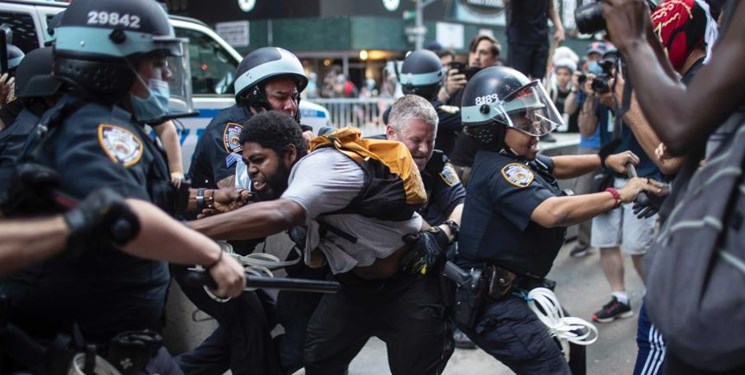In an interview with the website of the Strategic Council on Foreign Relations, Amir Ali Abolfatah said that popular protests with violence and repression in the United States would probably continue for some time. “However, these protests do not seem to last long, because the nature of social movements in the early 21st century, due to the lack of coherent leadership and organization, is such that they are violent and confrontational at the outset but recede quickly.
Possibility of Minor Economic & Political Reforms
He added: “These violent protests are unprecedented in the United States and will not lead to fundamental changes in America’s socio-political structure, but they will certainly be the source of a series of minor changes in the form of social and economic reforms.”
The US affairs expert noted the violent, widespread and devastating riots in Detroit in the 1960s, as well as other bloody clashes in 1992 in Los Angeles, adding that the riots each lasted several days, but because the media were not as strong as today the news arrived late in other parts of the world. This time, the broadcast of images from the unrest by social media and the powerful media creates the impression that what is happening in the United States these days is unprecedented in terms of violence and scale.
At the same time, Abolfatah said the unrest and events of the past few days were different from the previous protests from different aspects. “This time, a very aggressive president is stationed in the White House who believes in using the iron fist to quell protests and this could escalate the turbulence and make it more stable. At the same time, the unrest is coinciding with the outbreak of corona virus and the unemployment of about 40 million people, and taking many others into quarantine.
Interconnection of Racial Protests with Economic Demands
Abolfatah added that the US economy is not doing well at present. “In these protests, racial demands have been linked to economic demands, and this could prolong the protests for quite some time particularly that we have a few months till the US presidential election. The excitement of the elections in American society would make these conflicts more stable.
Referring to the looting of some stores during the recent protests, he said: “These actions have nothing to do with racial issues. Many people on the streets of the United States these days don’t necessarily have to worry about racial issues, and their problems are poverty and unemployment. People are hungry. In fact, a quasi “bread riot” is taking place in the United States, making it different from the 1992 protests. Because those protests were merely racial concerns caused by public outrage over racist behavior, we are now witnessing a kind of bread uprising in the United States.”
Impact of Unrest on Presidential Election
Regarding the effects of this violence and unrest on the US presidential election, he said: “Certainly, these issues are very important and national issues and will definitely affect the elections. Because American society is witnessing a deep political, social, and security crisis, it is not clear how far this influence will go and whether it will end up on the defeat Mr. Trump is not an easy question to answer. The US election is driven by a variety of factors and it is in the middle of the road and it is not yet easy to judge the government’s performance in crisis management.”
Abolfatah added: “Such protests in the United States will definitely be repeated; because there is a culture of racism in some people in the United States, and as long as that culture does not change, this problem will not be solved and will remain.”
Humiliating Literature and Trump’s Iron Fist
“We don’t see any signs of easing the crisis in the current situation, especially since Mr. Trump is not on the path to healing this filthy wound that has been opened, and he is constantly using degrading literature and iron fists, and arrests continue,” he said. Violence will certainly bring violence, and it will be difficult to contain the crisis. In addition, the outbreak of coronavirus has further exacerbated the situation.
Commenting on the longevity and impact of these protests in the short term, Abolfatah explained: “We have seen similar movements in Europe and the United States. Twentieth-century movements generally had leaders, organizations, hierarchies, ideologies, and goals, and usually achieved their goals, but these social movements are blind and instantaneous; they start with much excitement but subside after ignition. The Wall Street movement suffered the same fate.
He stressed: “Of course, if livelihood issues are linked to these grievances and the economic crisis continues, and the government is unable to help with the support packages to get the economy out of recession, we will surely see other social unrests of this nature.”










0 Comments